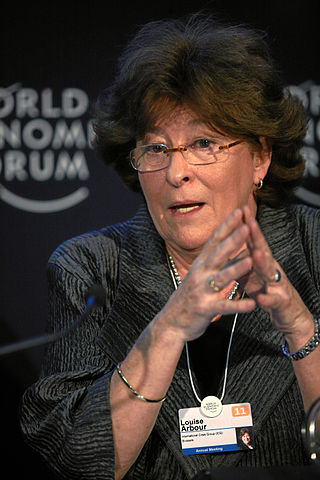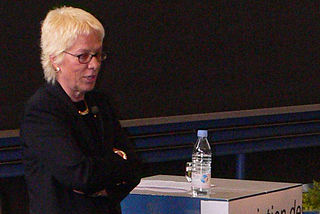
The International Criminal Tribunal for the former Yugoslavia (ICTY) was a body of the United Nations that was established to prosecute the war crimes that had been committed during the Yugoslav Wars and to try their perpetrators. The tribunal was an ad hoc court located in The Hague, Netherlands.

The International Criminal Tribunal for Rwanda was an international court established in November 1994 by the United Nations Security Council in Resolution 955 in order to adjudicate people charged for the Rwandan genocide and other serious violations of international law in Rwanda, or by Rwandan citizens in nearby states, between 1 January and 31 December 1994. The court eventually convicted 61 individuals and acquitted 14.

Louise Arbour, is a Canadian lawyer, prosecutor and jurist.

International criminal law (ICL) is a body of public international law designed to prohibit certain categories of conduct commonly viewed as serious atrocities and to make perpetrators of such conduct criminally accountable for their perpetration. The core crimes under international law are genocide, war crimes, crimes against humanity, and the crime of aggression.

The Lion, the Fox & the Eagle: A Story of Generals and Justice in Rwanda and Yugoslavia is a non-fiction book by Canadian journalist Carol Off. The hardcover edition was published in November 2000 by Random House Canada. The writing was favourably received and the book was short-listed for the Shaughnessy Cohen Award for Political Writing. With numerous interviews and extensive research behind it, the book presents biographies of three Canadians in United Nations roles in the 1990s: Roméo Dallaire, Lewis MacKenzie, and Louise Arbour.

United Nations Security Council resolution 780 was adopted unanimously on 6 October 1992. After reaffirming Resolution 713 (1991) and subsequent resolutions on the topic, the Council expressed its concern at the continued "widespread violations of international humanitarian law" in Bosnia and Herzegovina and authorised the Secretary-General Boutros Boutros-Ghali to establish a Commission of Experts to examine and analyse the information submitted pursuant to Resolution 771 (1992) on violations of the Geneva Conventions in the region.

United Nations Security Council resolution 827, adopted unanimously on 25 May 1993, after reaffirming Resolution 713 (1991) and all subsequent resolutions on the topic of the former Yugoslavia, approved report S/25704 of Secretary-General Boutros Boutros-Ghali, with the Statute of the International Tribunal as an annex, establishing the International Criminal Tribunal for the former Yugoslavia (ICTY).

United Nations Security Council resolution 935, adopted unanimously on 1 July 1994, after recalling all resolutions on Rwanda, particularly 918 (1994) and 925 (1994), the Council requested the Secretary-General Boutros Boutros-Ghali to establish a Commission of Experts to investigate violations of international humanitarian law during the Rwandan genocide.

United Nations Security Council resolution 936, adopted unanimously on 8 July 1994, after reaffirming resolutions 808 (1993) and 827 (1994), the Council appointed Richard Goldstone, a judge at the Constitutional Court of South Africa, as Prosecutor at the International Criminal Tribunal for the former Yugoslavia (ICTY).

United Nations Security Council resolution 955, adopted on 8 November 1994, after recalling all resolutions on Rwanda, the Council noted that serious violations of international humanitarian law had taken place in the country and, acting under Chapter VII of the United Nations Charter, established the International Criminal Tribunal for Rwanda (ICTR).

United Nations Security Council resolution 1259, adopted unanimously on 11 August 1999, after recalling resolutions 808 (1993), 827 (1993), 936 (1994), 955 (1994) and 1047 (1996), the Council appointed Carla Del Ponte as Prosecutor at the International Criminal Tribunal for Rwanda (ICTR) and the International Criminal Tribunal for the former Yugoslavia (ICTY).

United Nations Security Council resolution 1329, adopted unanimously on 30 November 2000, after recalling resolutions 827 (1993) and 955 (1994), the Council enlarged the appeals chambers at both the International Criminal Tribunal for Rwanda (ICTR) and the International Criminal Tribunal for the former Yugoslavia (ICTY), proposed the election of two additional judges at the ICTR and established a pool of ad litem judges at the ICTY.

United Nations Security Council resolution 1411, adopted unanimously on 17 May 2002, after recalling resolutions 827 (1993), 955 (1994), 1165 (1998), 1166 (1998) and 1329 (2000), the Council amended the statutes of the International Criminal Tribunals for Rwanda (ICTR) and the former Yugoslavia (ICTY) to address the issue of judges holding dual nationalities.
United Nations Security Council resolution 1431, adopted unanimously on 14 August 2002, after recalling resolutions 827 (1993), 955 (1994), 1165 (1998), 1166 (1998), 1329 (2000) and 1411 (2002), the council established a pool of temporary judges at the International Criminal Tribunal for Rwanda (ICTR) in order for it to complete its work as soon as possible.

United Nations Security Council resolution 1503, adopted unanimously on 28 August 2003, after recalling resolutions 827 (1993), 955 (1994), 978 (1995), 1165 (1998), 1166 (1998), 1329 (2000), 1411 (2002), 1431 (2002) and 1481 (2003), the Council decided to split the prosecutorial duties of the International Criminal Tribunal for the former Yugoslavia (ICTY) and the International Criminal Tribunal for Rwanda (ICTR) which had previously been under the responsibility of one official, Carla Del Ponte, since 1999.

United Nations Security Council resolution 1504, adopted unanimously on 4 September 2003, after recalling Resolution 1503 (2003), the Council appointed Carla Del Ponte as Prosecutor at the International Criminal Tribunal for the former Yugoslavia (ICTY).

United Nations Security Council resolution 1505, adopted unanimously on 4 September 2003, after recalling Resolution 1503 (2003), the Council appointed Hassan Bubacar Jallow as Prosecutor at the International Criminal Tribunal for Rwanda (ICTR).

United Nations Security Council resolution 1534, adopted unanimously on 26 March 2004, after recalling resolutions 827 (1993), 955 (1994), 978 (1995), 1165 (1998), 1166 (1998), 1329 (2000), 1411 (2002), 1431 (2002) and 1481 (2003), the Council called on the International Criminal Tribunal for the former Yugoslavia (ICTY) and the International Criminal Tribunal for Rwanda (ICTR) to complete all trial activities by the end of 2008.

The International Residual Mechanism for Criminal Tribunals (IRMCT) or the MICT in Kinyarwanda, also known simply as the Mechanism, is an international court established by the United Nations Security Council in 2010 to perform the remaining functions of the International Criminal Tribunal for the former Yugoslavia (ICTY) and the International Criminal Tribunal for Rwanda (ICTR) following the completion of those tribunals' respective mandates. It is based in both Arusha, Tanzania and The Hague, Netherlands.
United Nations Security Council Resolution 1877 was unanimously adopted on 7 July 2009.
















